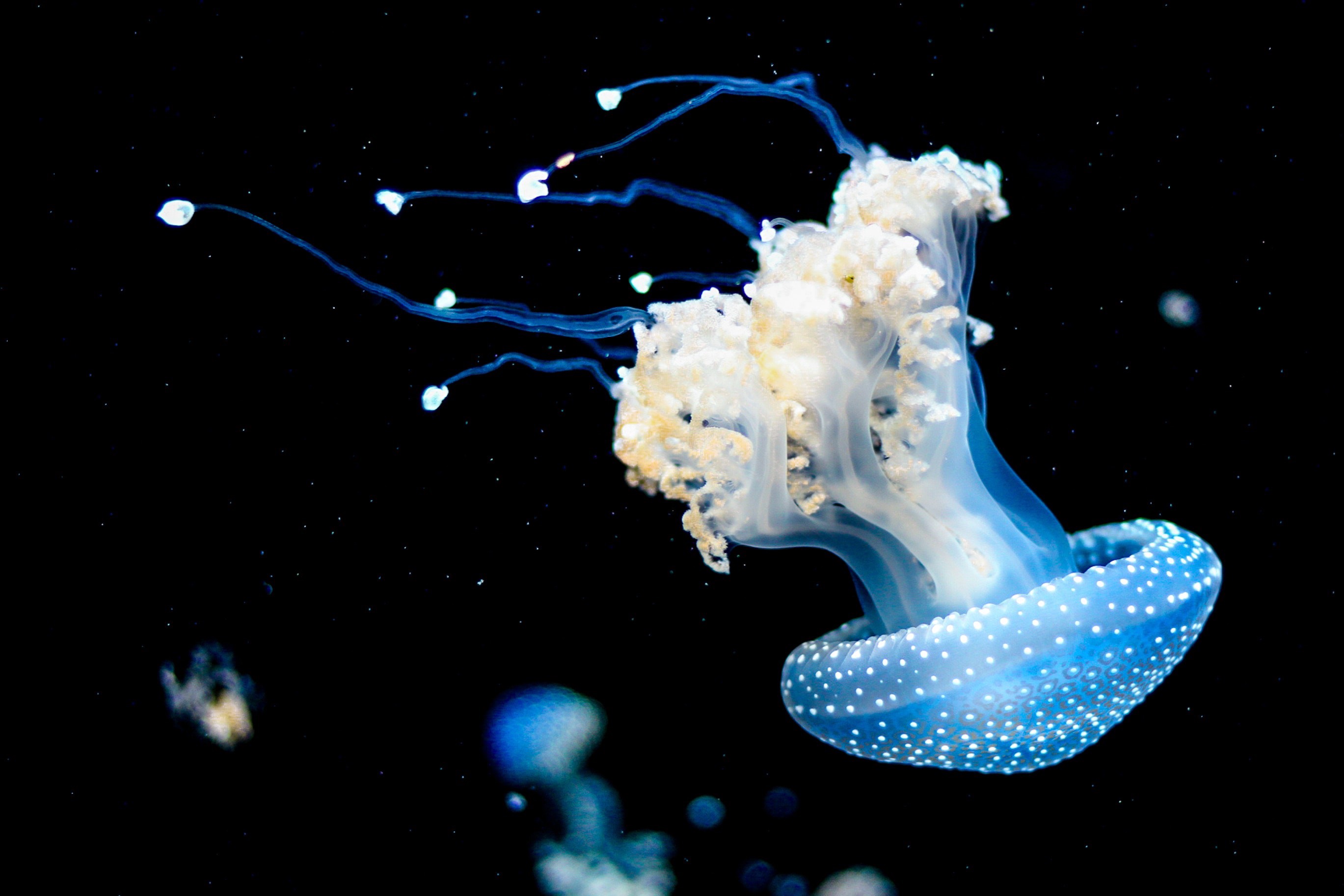Hint: don?t get stung by your own emotions.
 Don?t get stung by your own emotions ? Pic by Tavis Beck
Don?t get stung by your own emotions ? Pic by Tavis Beck
?To speak ill of others is a dishonest way of praising ourselves.? ? Will Durant
?Mother, what is water?? ? asked the baby fish
?Water is what you swim in. Water is what you?re mostly made of. It?s everywhere around you.? ? the mother fish replied.
?But I can?t see it.? ? said the baby.
Life?s most precious things are like water ? they surround us, yet we don?t see them.
Do you see what you have? Or simply pay attention to what other people have, achieve or the recognition they get? That?s how envy and jealousy get into your life ? rather than appreciating the water around you; they bring out the worst in you.
Jealousy and envy are related though are not the same ? they are two different types of poison.
How envy and jealousy harm you
?Jealousy is no more than feeling alone against smiling enemies.? ? Elizabeth Bowen
Envy and jealousy travel together but are different emotions ? both are negative and can make you feel miserable and ruin your relationships.
Envy is a two-person relationship: I want what you have. Jealousy is a three-person triangle: I want the recognition you have from others.
When you wish you have your colleague?s office, that?s envy. When you feel threatened by how much your boss praises one of your colleague?s work, that?s jealousy.
Envy is resentment toward others because of their possessions or success. You idealize when you are envious. You don?t just want what they have; you want their stature too.
Jealousy is when a third person threatens a relationship ? you are afraid to lose someone you love in the hands of other.
Jealousy is an anticipatory emotion as Ralph Hupka said. ?Jealousy causes us to take precautionary measures. Should those fail and the partner has an affair, the new situation arouses anger, depression, and disappointment.? the Professor of Psychology at California State University added.
Jealousy and envy are natural instincts. However, you can manage how you react. Both emotions mask other feelings that can become lethal. They hide our insecurity, shame or need to possess ? they feed our inner-critic making us feel worthless.
Envy is a reaction to lacking something; Jealousy is a reaction to the threat of losing something or someone.
A painful ancient symptom
Both jealousy and envy originate from the primitive fight-or-flight response. When you feel under attack, your brain triggers a warning signal.
Our tribal ancestors lived in fear of arousing the envy of the gods by their pride or good fortune. Hera?s envy for Aphrodite set off the Trojan War in Greek mythology.
Jealousy and envy are still the cause of most current conflicts both in the professional and personal world.
Envy drives to self-sabotage causing wars and others conflicts. It typically becomes a group phenomenon, and turns to hatred and assaults against others, as Frank J. Ninivaggi explains on Envy Theories.
We have a false sense of justice ? our system emphasizes the equality of all. That?s a curious paradox: the sense that we deserve our fair share of things is at the root of envy.
Life is not fair. There will always be people with more talents, health, possessions or reputation than yourself. Entitlement doesn?t help ? thinking that you deserve better makes you focus on the outcome rather than on the effort.
Jealousy originates from the prospect of failure; envy from actual ?failure.?
To let go of these two negative emotions, we must thoroughly understand where those feelings come from. And stop seeing yourself as a failure.
We create our own poison
?Envy is the religion of the mediocre. It comforts them, it soothes their worries, and finally, it rots their souls, allowing them to justify their meanness and their greed until they believe these to be virtues.? ? Carlos Ruiz Zafn
Buddhism teaches us that whatever causes our suffering has its roots in the Three Poisons: Ignorance, Hate, and Greed.
Ignorance is the mother of all poisons. It?s the belief that things are fixed and permanent. When we see that someone is doing better than us, rather than focus on how we can improve, we get stuck on the current status.
That?s why comparisons are deceiving: there?s always people that are better and worse than us. When we compare, we see things as static. We look outside (what others have) rather than inside (what we can change).
We create our own poison and then drink it.
Ignorance is clinging to people, objects or emotions. We don?t want things to change. It?s the desire to protect our idealized status. The antidote to ignorance is wisdom ? self-awareness can free yourself from poisonous emotions.
Hate arises from ignorance. We believe the world revolves around us. We want to stand out from the universe instead of seeing our connectedness to everything and everyone else. Our society is a system ? when we disconnect from it, we start seeing everyone as a competitor or an enemy. Envy and jealousy are just defense mechanisms.
Greed is not just wanting more ? it?s the fantasy that adding more stuff will provide personal gratification. Unfortunately, delusion creates a vicious cycle. Not only it frustrates us; we crave for more. Greed is also based on your need to protect your status ? you believe that objects define who you are.
Attachment motivates envy and jealousy. You cling to things or relationships you don?t have ? you want to be in control to feel more important.
Bertrand Russell said: ?Beggars do not envy millionaires, though of course, they will envy other beggars who are more successful.?
We direct our envy at those whom we compare ourselves such as your co-workers, friends, relatives or neighbors.
Social Media has not only expanded the ?beggars? you compare to; it?s an accelerant that turns envy into a wildfire. A picture-perfect society is doing us no good by encouraging envy and fruitless comparisons.
So, how can you avoid this lethal poison?
The antidote for envy and jealousy
If ignorance is the mother of all poisons, then wisdom is the universal antidote. Being wise is appreciating the water around you.
Wisdom is listening to other points of view rather than discriminating; to carefully examine facts even if they contradict our beliefs; to be objective rather than biased, and to always be ready to change our beliefs when opposite facts are presented to us.
Wisdom is to directly see and understand for yourself ? to keep an open mind rather than being closed-minded.
Certainty can cripple your wisdom, as I wrote here. Embracing a skeptical mindset will help you see life sharply. The path of just believing what you are told is easy. The path towards wisdom requires confidence, courage, adaptability, and patience.
The antidote for greed is generosity; the one for hate is loving kindness.
Letting go of your possessions and relationships requires wisdom too. You realized you don?t need to possess objects or people to be yourself. They can contribute to your joy, but your happiness does not depend on them.
Non-attachment doesn?t mean not caring ? it means recognizing there was never something to cling to in the first place. You stop looking at what others have. You free yourself from owning or being owned.
How to overcome being poisoned
?Don?t envy what people have, emulate what they did to have it.? ? Tim Fargo
1. Increase your self-awareness
To know yourself is to accept yourself. Self-awareness requires observing and accepting who you are ? not who you should or shouldn?t be. Reflect without judging yourself. Learn to be gentle and forgiving with yourself ? you?ll stop needing possessions or relationships to feel greater.
Are you jealous? Are you always comparing yourself to others? Deep inside you might feel insecure, frightened, betrayed or threatened. That?s okay. Feedback will help you uncover blind spots so you can conquer them.
To increase your self-awareness, you need to look outside, not just inside as I wrote here. People who score high in self-awareness know themselves well and understand how others see them too.
2. Free yourself from poisonous comparisons
Become your own standard. Learn to appreciate yourself for who you are, not for what you possess or your achievements. Success is personal ? happiness is defining success on your own terms.
Social pressure will only make you frustrated ? it seeds envy for not having more or make you feel jealous if someone gets more recognition than you do. Compare yourself to who you were yesterday. Focus on your improvement, not others?. Comparing to other people is a lose-lose situation.
3. Prevent an outbreak
Normal jealousy happens early in a relationship; it can be improved by improving the self-esteem of affected partners. Honesty is critical to stop early symptoms before they produce a jealousy outbreak.
Keeping and maintaining trust is not easy ? don?t confuse it with blind faith. Embrace trust as something fragile and imperfect, as I wrote here. Jealousy is about control; trust is about confidence and freedom.
You cannot avoid feeling jealous, but you can prevent it from getting worse and worse.
4. Emulate rather than envy
Looking at others for inspiration is not bad; the problem is trying to be like them. Medium Staff is full of articles on how Elon Musk, Steve Jobs, or Tony Robbins became successful and wealthy. That doesn?t mean you must follow their paths or aim for the same goals.
Reacting with emulation rather than envy is to open up to learn from others.
Each life is unique. Those who compare themselves to famous entrepreneurs end doing nothing. Choose your destination and take the learning route, not the shortcut. Copycats are boring; it?s better to be original as Leon Ho wrote here.
5. Feel the pain firsthand
Envy and jealousy are not just lethal for yourself. They can also harm those around you. Sometimes you need to take a little bit of your own poison to realize that.
Let others become your antidote.
If you are the jealous one, ask your partner to overplay her/ his jealous part for one or two weeks. Feeling the pain firsthand will help you realize the side-effects of your own behaviors.
If you suffer from envy, interact with people that have dramatically less or more than you have. Live one day with a total budget of two dollars. Volunteer one night to serve at a millionaire?s party. Compare both experiences to see what it says about you when you experience the extremes.
Life?s most precious things are like water ? they are around you waiting for you to pay attention and appreciate what you have.
Envy and jealousy are lethal poisons; it?s up to you to avoid being stung.
Increase Your Self Awareness
Receive my weekly ?Insights for Changemakers?: Sign Up Now
This story was originally published on Liberationist?s blog.


